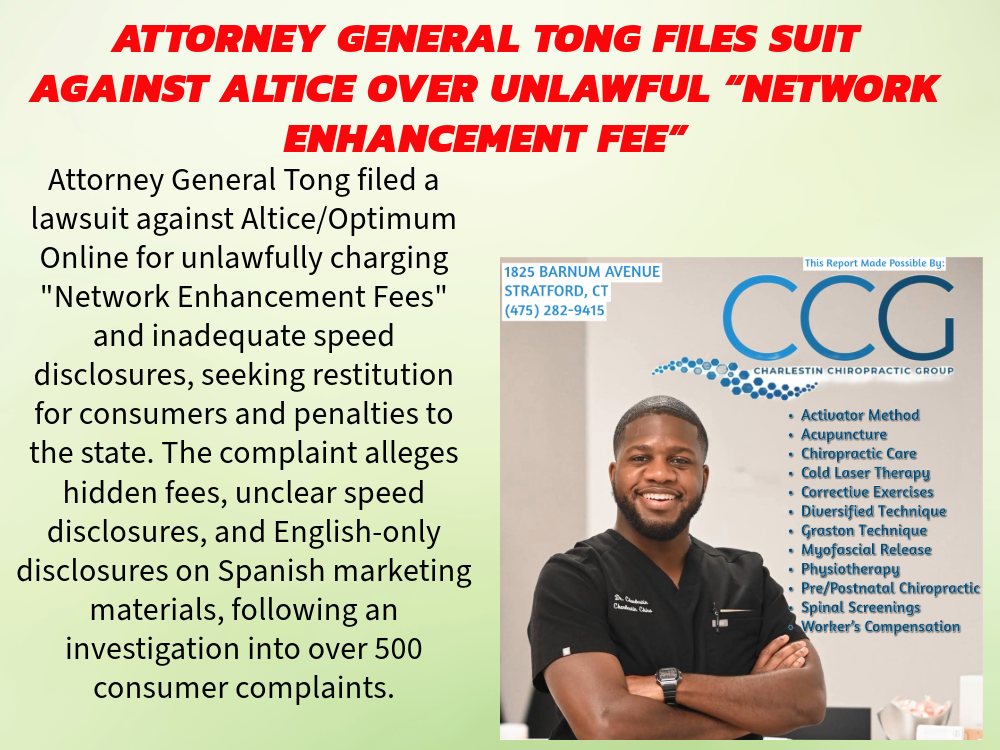
(Hartford, CT) – Attorney General William Tong today announced a lawsuit against Altice/Optimum Online, seeking to halt and recoup millions of dollars in unlawfully charged “Network Enhancement Fees.” The complaint further seeks to hold the company accountable for buried disclosures regarding limits to advertised speeds.
The complaint alleges three categories of violations of the Connecticut Unfair Trade Practices Act, including the improper fee, inadequate speed disclosures, and English-language disclosures on Spanish marketing materials. The complaint seeks both restitution for consumers as well as penalties to the state.
Since at least January 2019, Altice has charged Connecticut consumers a monthly “Network Enhancement Fee,” which has increased over time with limited disclosure from $2.50 per month to $6.00 per month. In total, Altice has collected millions of dollars from Connecticut consumers through the fee, over and above the regular monthly Internet service charge. For new customers, the fee was not disclosed up front, and appeared only in the shopping cart after a consumer selects an Internet service. Altice claims the fee is necessary to “maintain and improve the network”—a basic business function that customers already pay for in the base rate.
The complaint further alleges that Altice buries disclosures about the limits to their advertised speeds by listing them on the back of mailers in tiny print, in gray-on-gray backgrounds online and in print, and in small words that float away from the screen in their TV ads.
Finally, Altice sent out a large volume of Spanish advertisements with English-only disclosures.
“When customers pay for Internet service, they have a right to expect promised speeds and network reliability without being nickel and dimed with junk fees,” said Attorney General Tong. “Altice has extracted millions of dollars in hidden, escalating fees from Connecticut customers over and above the base rate simply to keep their network running. And even with all that extra revenue, they won’t stand by their promised advertised speeds without a series of fine print, fast moving caveats. Our complaint seeks to hold Altice accountable for these unfair, anti-consumer practices, and to stop and claw back millions of dollars in these inappropriately collected fees.”
“Just because junk fees are common practice, doesn’t mean we should settle for paying them, especially as companies find new ways to extract extra money from consumers,” said Department of Consumer Protection Commissioner Bryan T. Cafferelli. “This suit is just one of the many ways our state is working to combat the practice of junk fees, especially those that specifically target minority and non-English speaking communities.”
“Few phrases scream “junk fee” quite like “Network Enhancement Fees.” Scams like this fee take advantage of an internet environment with few options for consumers. I want to thank Attorney General Tong for standing up for Connecticut residents and taking legal action. Connecticut will continue to be at the forefront of protecting consumers both at the General Assembly and in the courtroom,” said Senate Majority Leader Bob Duff.
“These fees are indicative of deceptive, anti-consumer practices and are what the Energy and Technology Committee has worked to fight in recent years. Our service providers offer good service at affordable costs to customers – and then charge excessive fees while failing to meet the services they offered to provide. We deserve better as a state and I support Attorney General Tong’s work on this issue,” said Senator Norm Needleman.
The Office of the Attorney General first launched its investigation into Altice Optimum in November 2022, following more than 500 consumer complaints regarding hidden fees, poor technical support, and slow internet speeds.
This complaint follows a settlement reached in August 2022 with Frontier Communications following review of over 1,400 consumer complaints regarding equipment returns, poor internet quality, unsatisfactory customer service, and excessive charges. The Frontier settlement, worth over $60 million, expanded access to high-speed internet for Frontier customers in economically distressed communities, ended a hidden monthly $6.99 internet surcharge, and forced improvements in Frontier’s marketing and customer service.
Assistant Attorney General Rebecca Quinn and Deputy Associate Attorney General Michael Wertheimer, Chief of the Consumer Protection Section, assisted the Attorney General in this matter.
